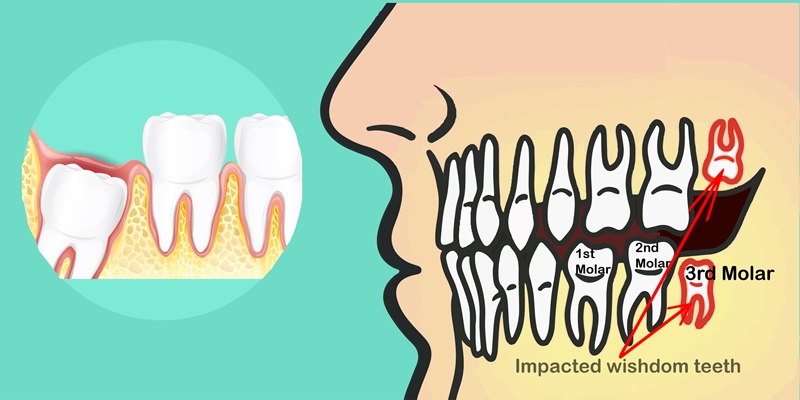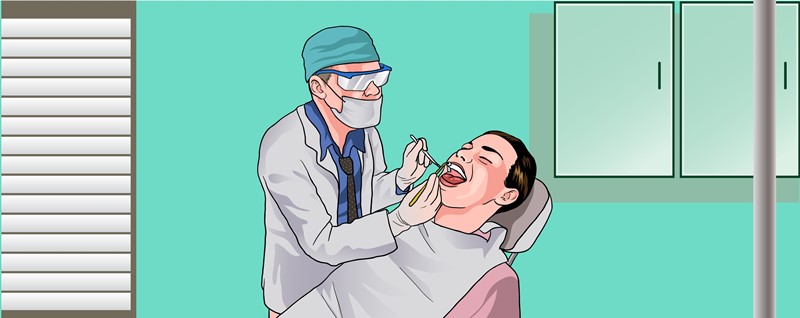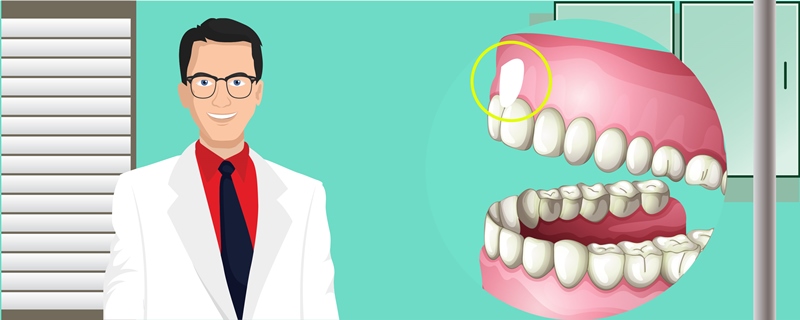Can wisdom teeth grow back? I’m sure your dentist has already given you the answer. But you are still not fully confident and looking for a more thorough answer. Good news, you have come to the right place.
Nearly 5 million Americans get their wisdom teeth extracted every year. Only 2% of the total world population is lucky not to grow any wisdom teeth. But most of us aren’t this lucky. Once a wisdom tooth starts to erupt, it needs to be removed.
According to many oral surgeons, even if the wisdom teeth aren’t causing any problem right now, it should be extracted as a preventive measure. Most people growth extra molars within the age of 17-25.
The earlier it grows, the better, because getting your teeth extracted at a young age is less painful. If you are afraid of the pain, time to be brave and visit your dentist.
Wisdom teeth can lead to several oral conditions such as tooth decay, swelling of gums and other gum diseases, and bacterial infection. Also, don’t forget the nerve-wracking pain.
If you are wondering whether your wisdom teeth will grow back after being pulled, the answer is no. There’s is a 99% chance that it won’t grow back. But I can totally see you panicking about the remaining 1%. I will discuss it thoroughly later in this article.
But right now, be assured that you belong to the 99% category. Maybe you will feel more confident if I explain why wisdom teeth, once pulled, never grow back.
Before that, learn what wisdom tooth actually is.
Table of Contents
- What Is Wisdom Teeth? Why Do We Have Them?
- When Do Wisdom Teeth Stop Growing?
- Why Wisdom Teeth Need to be Removed?
- Can Wisdom Teeth Grow Back after Surgical Removal? Here’s the Truth
- Rare Reason for Which Wisdom Teeth Can Grow Back
- Are You Confusing Post-Extraction Symptoms with Wisdom Teeth Eruption?
- How Long Does Recovery Take after Wisdom Teeth Extraction?
- Sum up
What Is Wisdom Teeth? Why Do We Have Them?
We get wisdom teeth, also known as third molars, for a purpose. By we, I mean our Neolithic ancestors who came to Earth 10,000 years ago. They needed these four extra teeth to chew tough, roasted meat.
Thanks to evolution, our brain expanded in size and consequently, our jaws became narrower. A narrow jaw didn’t have enough room for the extra molars. If an extra tooth starts erupting through the gums, it is called extra third molar or wisdom teeth.
If it doesn’t get enough room to fully erupt, it can grow sideways, be crooked or misaligned. If not removed, it can lead to immense pain, swelling and infection.
When Do Wisdom Teeth Stop Growing?
Technically, wisdom teeth are the last of our permanent teeth to erupt. These usually begin to grow around the age of 17. For most people, growth stops when they turn 25. In some rare scenarios, third molars can continue to erupt till your late 30s or even 40s.
Why Wisdom Teeth Need to be Removed?
Most dentists insist on removing the third molar as a preventive measure for tooth decay. You should immediately see a dentist if you are experiencing symptoms like tooth sensitivity, teeth, gum pain, swelling, headache, or stiffness in the jaw.
There’s a great chance that you will not experience any of these symptoms. Generally, people with large jaws don’t feel any discomfort as the wisdom teeth don’t collide with the other teeth in their mouth. Also, if there’s no sign of tooth decay or infection, your dentist will probably not remove it.
However, in most cases, extraction is necessary. Below I have listed the risk factors of wisdom tooth:
-
Impacted Wisdom Teeth
Human mouth doesn’t have enough space for 32 teeth. Only 28 teeth can freely erupt and align on our gum. When extra molars try to come through your jaw bone but don’t get enough room, they erupt partially.
Instead of being aligned horizontally, they move sideways. This may cause pain, sensitivity, swelling, ear pain, crooked teeth and damage of gum tissues, leading to Pericoronitis.
-
Crowding of Teeth
Your jawbone gets crowded when extra third molars start to erupt. It can disrupt the alignment of other teeth. Your dentist would advise you to remove these extra, useless teeth to fix the alignment of your regular, useful teeth.
-
Infection
If the extra third molars partially erupt after the gum, it can bring damage to the soft gum tissues. The impacted tissues will promote the growth of bacteria, leading to nasty infections. It can also cause gum bleeding, abscess, and lesions. Bacteria in your gum means bad breath as well. In worst case scenarios, you can also find it difficult to even open your mouth. This could be accompanied by headache, ear pain, jaw pain, and a weird, salty taste in your mouth.
Sorry to say but you will have to get your wisdom teeth removed under these circumstances in order to get rid of the pain, discomfort, and infection.
Can Wisdom Teeth Grow Back after Surgical Removal? Here’s the Truth
Enough with the technical blabbering. Now let’s address the main question, can wisdom teeth grow back?
Well, they usually don’t after being extracted. Most of us can only have 1-4 wisdom teeth at the back of our mouth, behind the molars.
Once the extra molars are extracted, there is no way it will grow back. We, humans, are diphyodonts. Our milk teeth set or deciduous set is replaced with permanent teeth set. This permanent set is strong enough to help us chew solid food.
Once all your permanent teeth have erupted, there will be no teeth bud left to grow. Wisdom teeth are permanent teeth. Once they are surgically removed from the socket, there’s no way they are coming back. So chill!
Rare Reason for Which Wisdom Teeth Can Grow Back
-
Hyperdontia or Supernumerary Teeth
There are a few unlucky folks who can have more than 4 wisdom teeth. This 5th molar may grow back even after extraction. This is called a supernumerary. Your dentist probably didn’t remove it earlier because it appeared very tiny and underdeveloped in X-ray.
Once your wisdom teeth are surgically removed, the supernumerary impacted tooth gets enough room to erupt. Although it sounds scary, it is very rare. It only happens in 1 out of 100 cases.
-
Elevated Bone
After a few months of surgery, you may feel a slight elevation in the operated area of your jaw. Don’t mistake it for a re-grown wisdom tooth. It is most likely an elevated bone.
his might occur if your dentist had to drill your jaw bone to pull a tooth stuck deep inside it. Give your teeth some time to heal. If you still feel the protuberance after a few weeks, consult your dentist. It can be fixed by a simple surgery.
-
Partial Extraction
During the surgery, your dentist may leave some part of the teeth or maybe just the root tip intact. This tiny root can “super erupt” in the same area. So make sure to appoint a well-trained dentist or oral surgeon for the extraction. And also, pray to God.
-
Re-formation of Dental Follicles
There’s another way wisdom teeth could grow back. If you got your wisdom teeth extracted at an early age, the soft tissue remnants of the teeth (dental follicle) may re-form a tooth years later. However, please know that this is just in theory. Any instance of such kind has not been documented yet.
Are You Confusing Post-Extraction Symptoms with Wisdom Teeth Eruption?
There is a high chance that you are confusing post-extraction irritation with wisdom tooth regrowth. Nonetheless, if you are experiencing any of the following symptoms, don’t worry. Be patient and take your medicines on time. Post-extraction symptoms should fade in a few weeks. If they persist longer, talk to your dentist.
Here are a few signs to watch out for:
- A swelling, lesion or soreness in the wisdom teeth area.
- Something solid, like a bony spicule in the wisdom tooth socket.
- Immense pain in the area.
- If you are feeling a part of your tooth is left in the socket.
- Gum infection.
- Throbbing pain in the head.
How Long Does Recovery Take after Wisdom Teeth Extraction?
Wisdom teeth removal is very common. It’s totally okay to feel anxious and worried about the surgery pain. How much it will hurt depends on the location of the teeth and how much they are impacted.
I won’t sugarcoat anything. While the local anesthesia will numb your mouth area, you will be awake during the process. If the teeth are stuck in the depth of your jaw bones, the surgeon might put you on a mild sedative.
The extraction takes 1-2 hours to complete. For normal extraction, the recovery may take anywhere between a few days to a few weeks. However, if your bone has been drilled, it could take longer. Make sure you to bring someone along with you to the dentist’s chamber on the day of surgery. You shouldn’t drive immediately after the extraction.
Sum up
It’s completely fine to have your worries before getting your wisdom teeth pulled. Don’t be scared to get it removed out of the fear of pain. Leaving them untreated will cause way more pain in the future. Last but not the least, let me assure you again that wisdom teeth regrowth is extremely rare. It only happens to 1 out of 100 people. The odds are in your favor.







